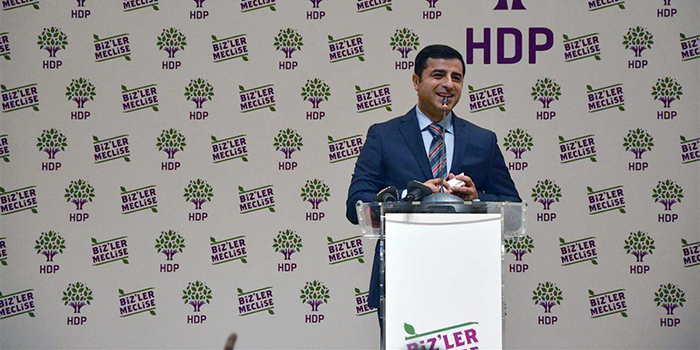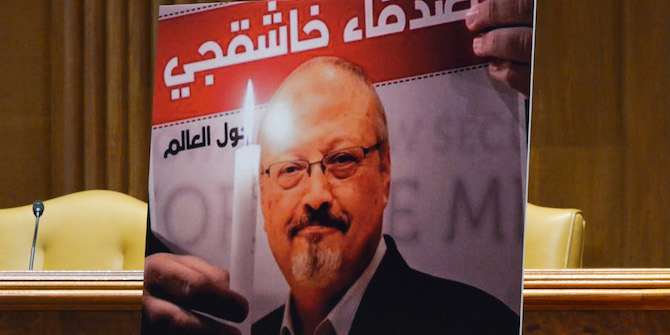by Mustafa Cagatay Aslan

Turkey will hold a parliamentary election on 7 June. The main aim of the incumbent Justice Development Party (AKP) is to have at least 330 seats in order to change the political system from a parliamentary regime to a ‘presidential’ one. In his piece, Mustafa Cagatay Aslan suggests that whether the AKP achieves its aim depends on one internal and one external factors to the party. Internally, the party must win at least 40 percent of votes. Externally, the People’s Democratic Party (HDP) must remain under the electoral threshold. The distribution of seats among the political parties in earlier elections (2007 and 2011) indicates that the presence of the second condition is necessary for the AKP to achieve its aim. Otherwise, the party will definitely not be able to secure its 330 seats even if it were to win more than 40 per cent of the votes.
Parliamentary elections in Turkey will be held on June 7 2015, marking the 17th ‘fair and free’ election since 1950. The results of the elections are very important, as they will determine whether the existing parliamentary regime will be replaced with a presidential system – an idea that has already created a schism within the Turkish political sphere. The ruling party, Justice and Development (AKP), emphasises that a presidential system will bolster stability and economic growth. The opposition parties, on the other hand, argue that a presidential system would pave the way for authoritarianism; thereby, halting the democratisation process. Instead, they argue that Turkey’s existing parliamentary system should be shored up to make it much more conducive to liberal democracy
A shift to a presidential system is possible with a constitutional amendment that requires 367 ‘Yes’ votes, or 330 ‘Yes’ votes with a subsequent referendum, in which a single majority is sufficient. Then, assuming no defection or and no cooperation with another parliamentary party, the AKP needs to secure at least 330 parliamentary seats. Recent polls suggest that more than 40 per cent of voters support the AKP. Nevertheless, this isn’t sufficient for the AKP to reach the required number of seats to secure a majority. In addition, the distribution of seats in earlier elections suggests that pro-Kurdish People’s Democratic Party (HDP), excoriating the presidential system, must also remain under the electoral threshold, of 10 per cent. Thus, the results of the upcoming elections can turn the HDP, once outsiders, into the protectors of the existing political regime in Turkey.
The only political parties who exceeded the threshold in the 2002 elections were the AKP and CHP. Winning 34.28 per cent of the votes, the AKP secured 363 seats out of 550, while the CHP won 178 seats for 19.39 per cent of the votes. Both parties’ support increased in time for the 2007 elections, yet the number of seats they received decreased: 341 out of 550 for the AKP, and 112 for the CHP. This inconsistency was the result of the two factors: first, the MHP succeeded in exceeding the electoral threshold. With 14.27 per cent of the votes, the MHP secured 71 seats. Second, 22 candidates, practically supported by the HDP, but competing independently to be granted immunity from the requirement of electoral threshold, entered parliament, adversely affecting the number of the AKP’s seats. A similar scenario to that of 2007 occurred in the 2011 elections. Despite more increase in its electoral support to 49.8, the AKP secured even less seats, 327 out of 550. The CHP increased both its electoral support and number of seats. Winning 25.98 per cent of votes, it reserved 135 seats. The increase in the CHP’s seat would be attributed to the decline in the electoral support for the MHP, which secured 53 seats with 13 per cent of votes. The reason for the decline in the number of seats secured by the AKP was the increase in the number of independent seats, reaching to 35, which competed on the HDP’s ticket, once again unofficially. Because the MHP and the CHP receive insignificant electoral support in constituencies of East and South East Anatolia and the HDP is the only party that can effectively challenge the AKP, the failure of the HDP in exceeding electoral threshold primarily (disproportionately) benefits the AKP. For example, 18 out of 22 HDP seats in 2007 and 32 out of 35 HDP seats in 2011 would be reserved by the AKP if the HDP attended to the elections on its own and failed to exceed the electoral threshold.
In the eve of the 2015 election, the HDP decided to run for elections. Contrary to the elections of 2007 and 2011, the HDP has to exceed the electoral threshold in order to obtain seats in the parliament. It received 6 percent of the local elections votes held in March 2014 and its nominee for presidency, Selahatin Demirtas, received 9.76 per cent of votes in the elections conducted in August 2014. These results clearly show that the HDP still has a long way to go in order to exceed the electoral threshold. Its failure to do so would guarantee the AKP’s needed 330 seats in parliament; thereby, paving the way for change in the political regime in Turkey. The HDP still has a chance of appealing to Kurdish voters, who voted for the AKP in the previous election, and to Social Democrats factions of the CHP, who are likely to retort to vote for the HDP lest the AKP gained sufficient majority in the parliament to change the political regime. In a nutshell, it is the extent of the HDP’s success that will determine the fate of the existing political regime in Turkey. Thus, once ‘outsiders’, the HDP can turn into the ‘protectors’ of today’s parliamentary regime in Turkey.
 Mustafa Cagatay Aslan is Research Fellow at the Department of Political Science and International Relations, Istanbul University. His PhD degree on Radical Right Parties in Central and East European Countries was awarded by the University College London (UCL). Aslan also received a MSc Degree in Comparative Politics from the Department of Government at LSE.
Mustafa Cagatay Aslan is Research Fellow at the Department of Political Science and International Relations, Istanbul University. His PhD degree on Radical Right Parties in Central and East European Countries was awarded by the University College London (UCL). Aslan also received a MSc Degree in Comparative Politics from the Department of Government at LSE.






